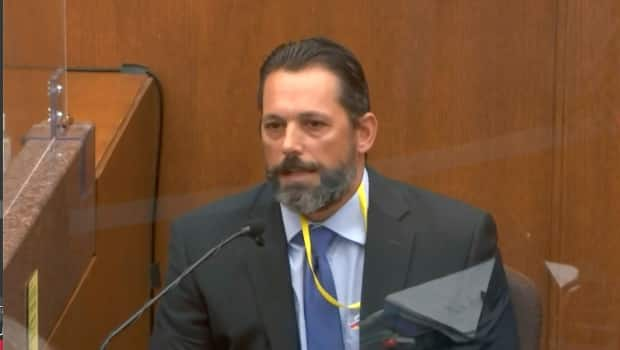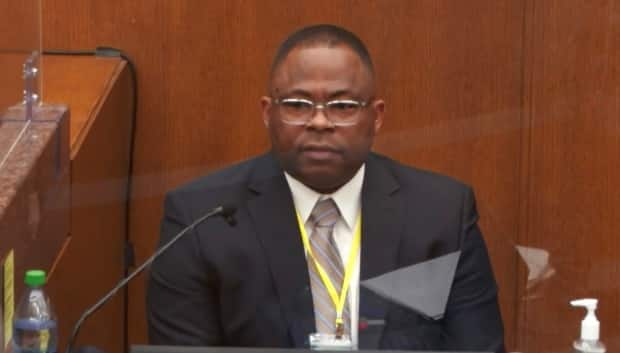Shouts of 'you're killing him' could have prompted Chauvin to reassess use of force, trainer testifies

Derek Chauvin could have potentially reassessed his actions when irate bystanders yelled at him that he should get off of George Floyd because he was "killing him," a lieutenant who trains police officers in use-of-force techniques acknowledged on Tuesday.
Lt. Johnny Mercil, a Minneapolis police officer, was one of the officers who trained Chauvin in proper use-of-force techniques. He was also the latest in a series of senior officers with the force, including Minneapolis Police Chief Medaria Arradondo, who have testified that Chauvin, with his knee pressed into Floyd's neck during their confrontation on May 25, 2020, used excessive force and violated police procedure.
Chauvin, 45, who is white, faces two murder charges — second-degree unintentional murder and third-degree murder — in Floyd's death. The 46-year-old Black man died after Chauvin pressed his knee against the back of Floyd's neck for around nine minutes as other officers held him down. Chauvin's trial is now in its second week.
Use-of-force trainer testifies
During cross examination, Chauvin's lawyer Eric Nelson, who has argued that police at the scene were distracted by what they perceived as a growing and increasingly hostile crowd of onlookers, asked if Mercil agreed that a crowd jeering at police officers will raise alarms within the officers. Mercil agreed.
However, prosecutor Steve Schleicher quickly followed up with his own question about the bystanders, asking: "If they're saying 'Get off him, you're killing him,' should the officer also take that into account and consider whether their actions need to be reassessed?"
"Potentially, yes," Mercil said.
Earlier, Mercil was asked more specifically about the use-of-force procedures and how they relate to this specific case.
Knee to neck not part of training
He was shown a picture of Chauvin with his knee pressed into Floyd's neck. Schleicher asked Mercil if that restraint was part of the training at the Minneapolis Police Department.
"No sir," he said.
Mercil said a knee on the neck is an authorized use of force, but that officers are told to stay away from the neck if possible. Schleicher asked Mercil how long such a technique should be used if an officer were to employ it.
Mercil said it would depend on the resistance being offered.
"Say, for example, the subject was under control and handcuffed — would this be authorized?" Schleicher asked.
"I would say no," Mercil said.

Video captured by a bystander showed the handcuffed Floyd repeatedly say he couldn't breathe.
Floyd had been detained outside a convenience store after being suspected of paying with a counterfeit bill. All four officers were later fired. The footage of the arrest prompted widespread outrage, setting off protests across the U.S. and around the world.
The prosecution says Chauvin pressing his knee into Floyd's neck as he lay handcuffed on the pavement was the cause of his death. But the defence argues Chauvin did what his training taught him and that it was a combination of Floyd's underlying medical conditions, drug use and adrenaline flowing through his system that ultimately killed him.
Records show that Chauvin was trained in the use of force by the police department in October 2018.
On Tuesday, Mercil also told Hennepin County District Court that police should try to put a suspect in the "recover" position, sit them up or stand them up, as soon as possible to decrease the risk that they might have difficulty breathing while on their stomachs.
'I would say it's time to de-escalate the force'
Under cross-examination by Nelson, Chauvin's lawyer, Mercil acknowledged that, in his experience, there have been times when suspects he was in the process of detaining were lying about having a medical emergency.
Mercil also testified that circumstances can change minute to minute; that a suspect can go from being compliant and peaceful to violent, and he agreed that all of those considerations play a part in the use of force.
He also said there have been times when an unconscious suspect regained consciousness.
Mercil also acknowledged that just because a person is handcuffed, doesn't mean the suspect is in control, and that he has trained officers to restrain suspects as "long as they needed to hold them."
But Schleicher then asked Mercil whether it's inappropriate to hold a suspect in a position where the officer's knee is across their back or neck once the person is under control and no longer resistant.
"I would say it's time to de-escalate the force."
"And get off of them," Schleicher said.
"Yes sir," Mercil said.
Mercil agreed that if an officer is placing body weight with the knee on a person's neck and back it would decrease the person's ability to breathe. He also agreed that it would be inappropriate to restrain someone in that way after they had lost their pulse.
Mercil was asked if there was ever a time when an individual lost their pulse, suddenly came "back to life" and became more resistant.
"Not that I'm aware of," he said.

Use of force 'was excessive': expert
In other testimony, Jody Stiger, a Los Angeles Police Department sergeant serving as a prosecution use-of-force expert, said officers were justified in using force while Floyd was resisting their efforts to put him in a squad car.
But once Floyd was on the ground and had stopped resisting, Stiger said officers "should have slowed down or stopped their force as well."
Stiger said that after reviewing video of the arrest, "my opinion was that the force was excessive."

